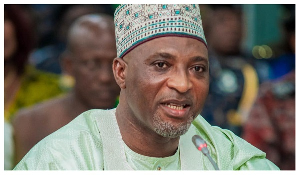
Music has been tagged “an international language”, a cultural instrument often used at festivals, funerals, dances, dinners, parties, weddings and political rallies.
Music also adds spice to life, is considered food for love and the philosopher’s companion.
The canary bird for example is usually caught and caged because of its melodious music; dogs have some kind of music that indicates that they are on heat. Music can be used for wooing and marriage.
I have heard some Ewes break into song that delivered messages to their colleagues in the midst of mixed groups; the enslaved black Americans used song to publicise secret meetings and passing on messages through the lingo the whites could not understand.
Music spans the globe now that the world has become “a global village”. Indeed, music can be said to have globalized the world even before ICT.
Music has been in Ghana for ages and in modern times, people like the late Mr. A. A. A., Amakye Dede, Daddy Lumba, and Nana Kwame Ampadu I, musician turned contractor turned evangelist but now also a “moving forward” political prophet, have all used music and song for love, philosophy, mourning, comment and analysis to a varying degree.
In other instances, Barrack Obama of the U.S.A. is riding high on his presidential campaign hopes on a song using his name; Jewel Ackah has done it in the past for the NDC, and now Nana Akufo-Addo is enjoying a T.V. musical that says he is the right man for Ghana.
Jimmy Cliff, the Jamaican Reggae star, was once in Nigeria and was thrown in jail. Listen to what he says;
Have you heard the news? (2x)
I was in Africa
Down in Nigeria
Oh they threw me in jail
I had one hell getting bail
Here, Jimmy Cliff, who is of African descent, complains about how his “motherland” treated him badly by throwing him in jail on a trumped up charge.
Bob Marley’s music, though reggae, concentrates on politics, exploitation and the raw deal the Black Man is dealt by the white race. He should by now be saddened by what is happening in Zimbabwe where he performed live on the country’s attaining independence.
Good old James Brown, the Godfather of Soul, was more interested in the dignity of the Black Man and shot to fame world wide with his “Say it ‘Loud: I am Black and proud”. Last year, during the African Footballer of the Year Awards, Batman now Samini and Yvonne Chaka Chaka performed at the venue of the ceremony, the National Theatre in Accra.
But, what is the current situation of the Ghanaian musician when he grows old? Does he have a goat?
A musician in Kumasi says Ghanaian musicians would continue to slip down the deep trenches of poverty if they continued with selfish interests, lack of cooperation, coordination and unity. Wide-eyed but soft and gentle Joe Takyi-Boateng, a general music consultant and leader of the GPRTU band, the Transport Melodians, in Kumasi, was, in comment, particularly insistent on the disunity among musicians in Ghana over the decades. The division in the leadership of MUSIGA as a result of leadership ambitions is one of the problems.
Speaking to me in his modest but inviting office, and quoting the Holy Scriptures, he said, “A house divided among itself cannot stand,” therefore, “Musicians divided among themselves can not survive”.
“In Ghana, every musical band or group usually comprises at least five members,” adding “if we came together we could, therefore, access insurance companies in the country and benefit from the opportunities provided by the Social Security and National Insurance Trust, SSNIT, for example”.
The general music consultant and leader of the Transport Melodians was sure that Ghanaian musicians would not turn miserable in their old age, lacking retirement age benefits. He recalls, “K.A. Adusei of Starlite Band fame died in a kiosk, a miserable pauper! How about S.K. Oppong of Osofo Dadzie fame; Kwame Attah of F. Micah’s Band? They all died without recognition when they should have reaped riches and wealth from their musical careers. He cited Kiki Gyan of Osibisa, Ghana’s youngest, very talented, millionaire organist who unfortunately succumbed to narcotic drugs and died in a church toilet.
Asked what Ghanaian musicians should do to avoid “penniless last days”, Mr. Takyi-Boateng insisted that “planning” was the watch word. “You see,” he cried, “most musicians in Ghana tend to chase a lot after women, even married women, and are generally spendthrift. Thus, within time, they lose their talent to alcohol; get drained of their physical strength and their money goes to waste due to frivolous spending.”
He was sure that if Ghanaian musicians marketed themselves properly, married not only women of substance but women of character, their last days in life would be enjoyed. “Without that,” he maintained, “there would be no future for us.”
Mr. Joe Takyi-Boateng, who is also the Ankobeahene of Akoawei, Adukrom-Akwapem, in the Eastern Region of Ghana, advised his colleagues in the industry, “We should not champion our own downfall. We must rather unite and plan, contribute to SSNIT for a retirement in comfort and happiness”. He added quickly that the youth today are cruising at breakneck speed to acquire riches and wealth; engaging in drug and narcotic addiction which merely catapults them to a life of misery either by incarceration in prison or becoming insane, roaming the streets of our cities and towns, becoming denizens of our streets.
That, to Joe Takyi-Boateng, was unacceptable; he rued the situation and waxed political, “We must ‘change and move forward;’ music is not poor; it is rich; why should musicians in Ghana be poor?” Well, do Ghanaian musicians have a goat?
















